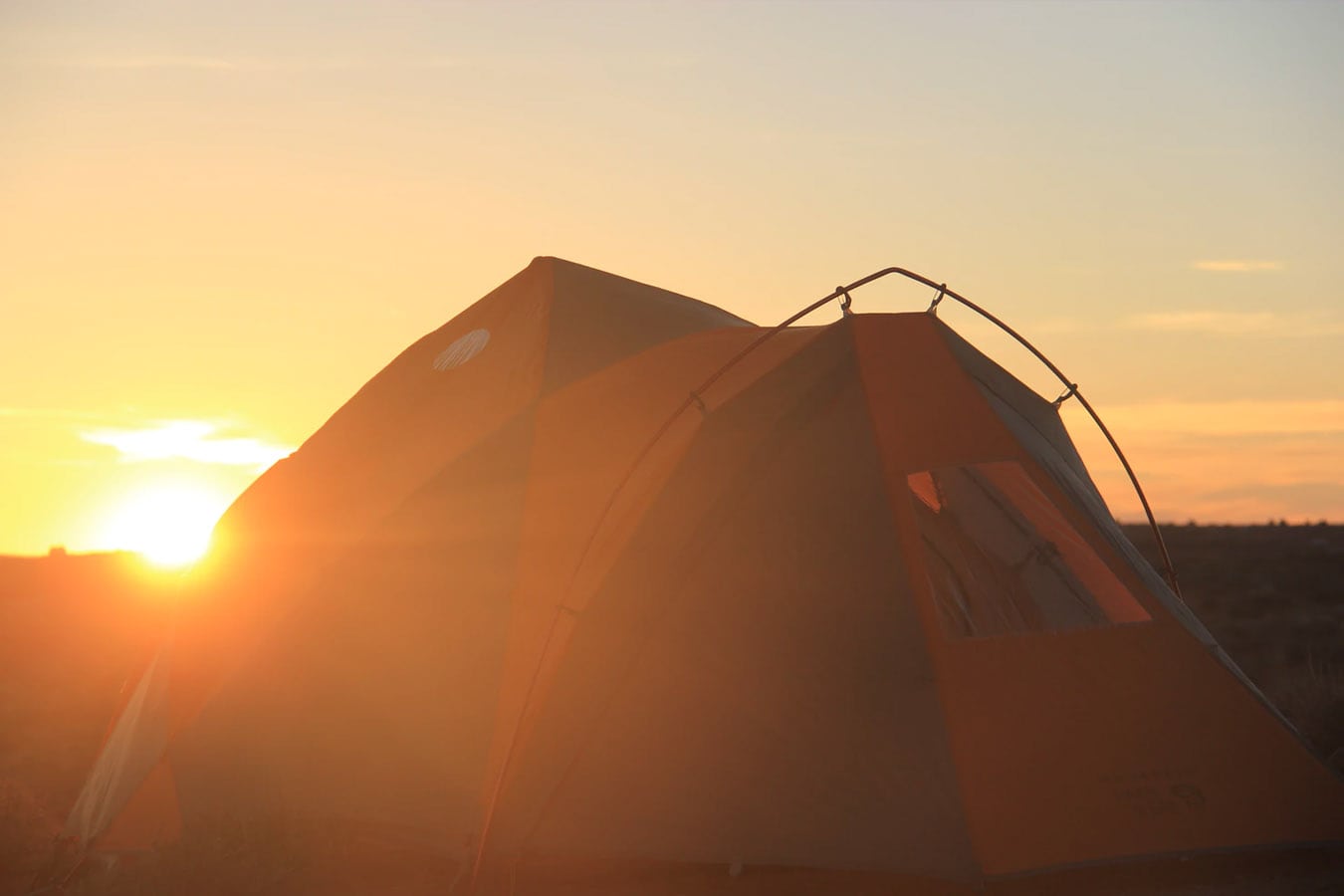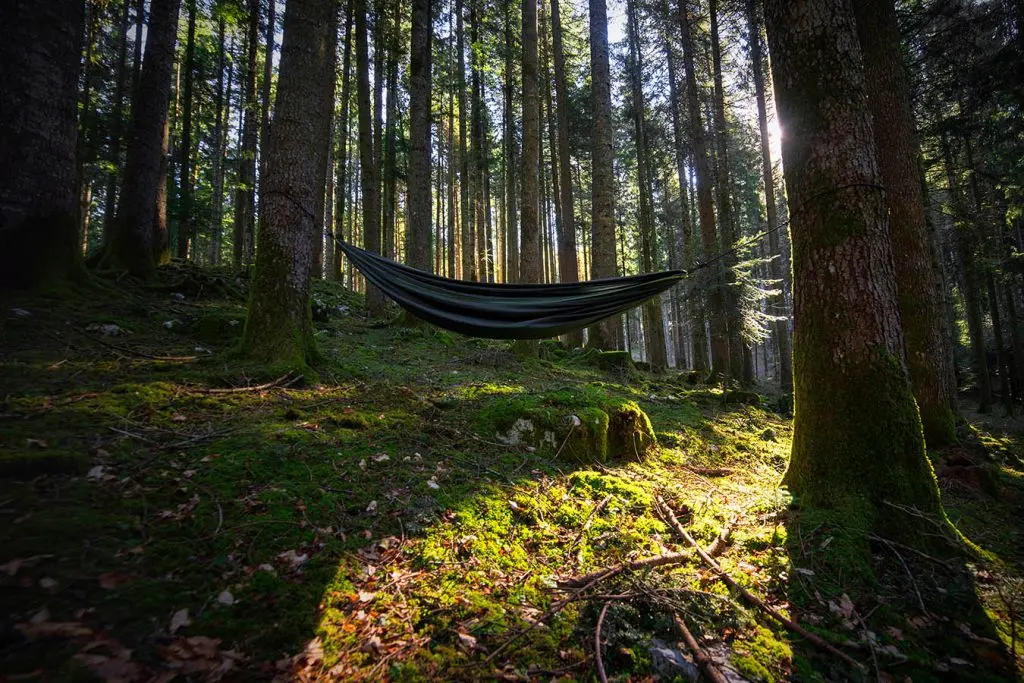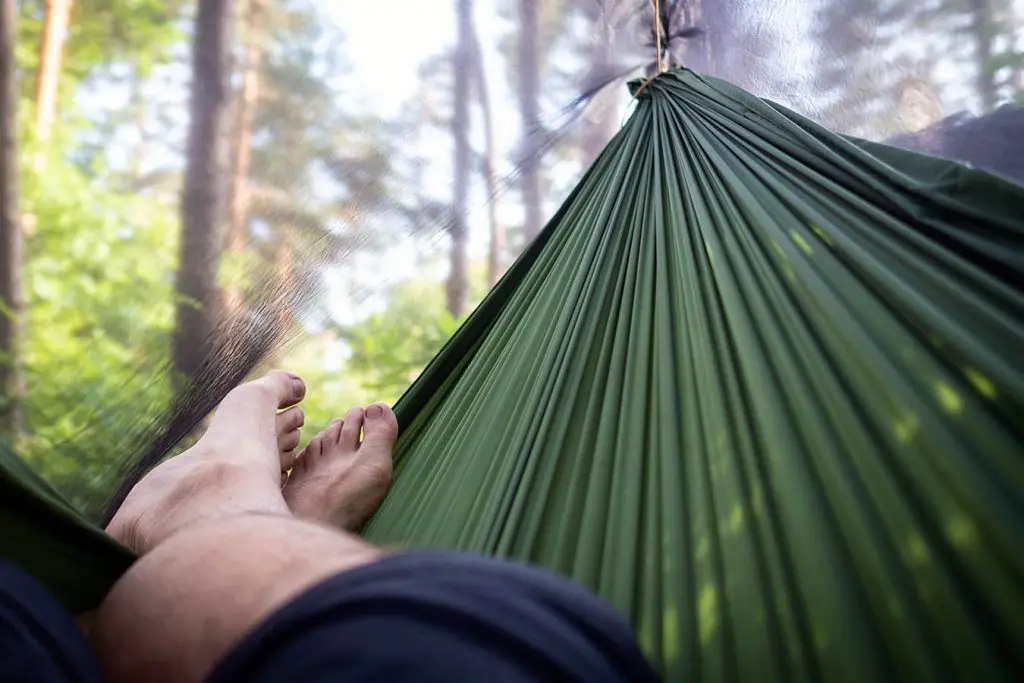As a camper, you probably have very valid concerns regarding the use of a tent heater inside your tent. And for good reason, because fire and tents do not go well together without the right safety precautions.
The good news is that when you have just a little background information and knowledge, you will be able to use any tent heater safely every time you head out.
To this end, we have created this guide that will teach you how to safely use a tent heater, and highlight the safety measures you need to have in place and the potential dangers that can occur.
Are tent heaters safe?
The short answer to this question is yes, tent heaters are generally safe. However, the longer version involves several measures that you must put in place to ensure they remain so.
There are three types of tent heaters; electric heaters, wood tent heaters, and propane tent heaters. Each of these has its set of advantages and disadvantages.
For instance, in the absence of electricity, you can choose a wood or gas tent heater. Wood heaters can run on wood that’s readily available at most camping grounds, but their use increase the levels of carbon monoxide emissions (CO). CO is a potentially fatal gas.
On the other hand, the gas heaters produce far less CO, although their emission levels will increase if they are faulty. Poorly maintained models can also be prone to explosions, and so please always make sure that they are functioning properly before you leave for your trip.
Overall, an electric tent heater is the safest. However, you will obviously require a source of electricity to power this. To make it even safer, you need to put in place measures that will prevent the exhaust gases from accumulating within your tent.
To this end, some tent heaters come installed with automatic shut-down mechanisms for when CO levels are too high.
Furthermore, other tent heaters also come designed with a tip-over feature. In case they are knocked over, they will automatically shut down. Look for heaters with such safety measures.
There are also battery powered heaters. They work the same way as electric heaters but instead of a power outlet, they rely on batteries. They are arguably safer and more convenient than regular electric heaters, but they are rare and often very expensive.
Can you sleep with a propane heater on?
It is possible to sleep with a propane heater on the whole night without being adversely affected.
However, if you have the option of not doing this, then don’t. That said, here are safety precautions you can take when you wish to leave your propane heater on the whole night:
- Ventilation: The idea is to ensure that in case there’s excessive production of Carbon Monoxide, it will find its way out of the tent. Leaving the tent open might seem counterproductive, but your safety should be your biggest concern since CO is a fatally poisonous gas. Some symptoms of CO poisoning include nausea, dizziness, and headaches. If you experience any of these, be sure to get some fresh air right away.
- Install a CO detector: You can also increase your safety further by installing a carbon monoxide detector. Some propane heaters come with CO detectors, and they will automatically shut down if the levels become too high. However, if yours does not come with one, you can buy a portable product and have it in your tent. The detector is designed to sound an alarm every time CO levels reach above the safe amount. Most CO detectors are battery powered, so you can use them anywhere.
- Regularly check for gas leaks: It is a good idea to always check whether there is a gas leak. To check for a leak, simply apply soapy water on the cylinder, heater unit, or even the hose. If bubbles start forming, or if you can hear the gas escaping, do not turn the heater on. Also, if you suspect that there may be a leakage, do not turn the heater on.
- The tip-over feature: This feature in tent heaters increases your safety. Heaters with this feature will automatically turn off when tipped over.
- Keep your heater out of the way: You should place your heater away from traffic or where it might be knocked over.
- Run the heater on a need basis: Whenever possible, avoid leaving your heater unattended, especially overnight. You end up saving money and reducing the risks of gas poisoning while out camping.
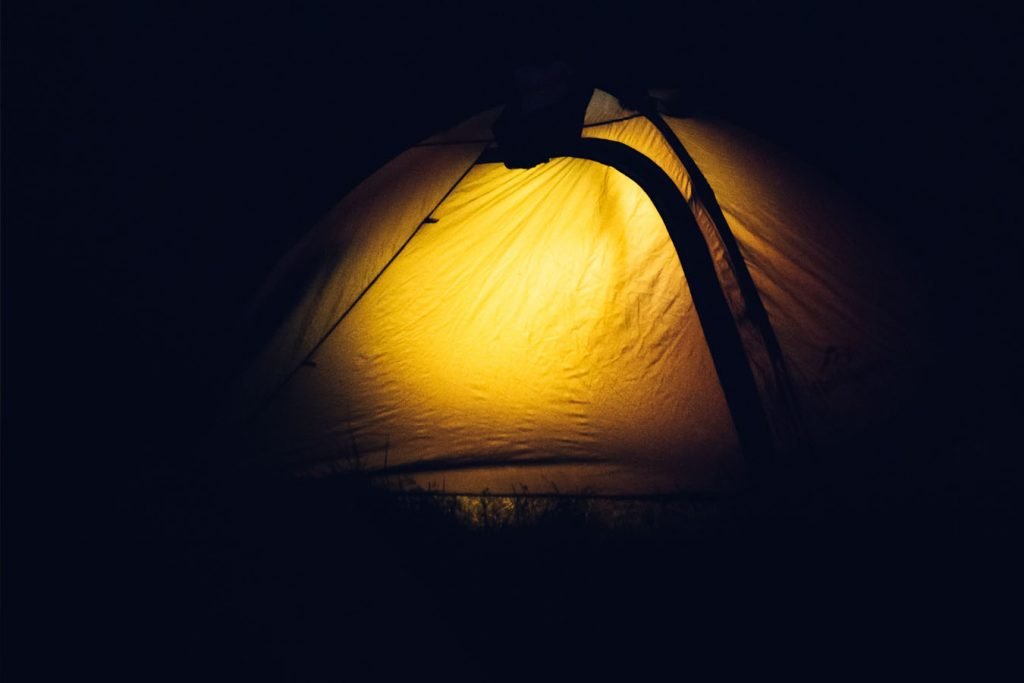
Can you get carbon monoxide poisoning from a propane tent heater?
Yes. Carbon monoxide is the cause of about 25% of all propane heater fatalities.
Typically, carbon monoxide (CO) is produced as a result of incomplete combustion. Complete combustion should produce Carbon dioxide (CO2) which is safer.
How does combustion occur? There are 3 ingredients required for complete combustion, including ignition, fuel, and air (Oxygen). There is also a specific ratio that guides propane and air utilization during combustion. This means if it is not well balanced, the propane won’t burn completely, even if ignition is introduced.
The best ratio for complete combustion is 1:24, or 4 propane parts to 96 oxygen parts. This concept is described as the “limits of flammability”. Technically, combustion will only occur within these boundaries. Incomplete combustion that produces carbon monoxide is within the limits of flammability but either lower or higher than the ideal ratio.
This concept is explained even further by two other concepts: propane lean burn and propane rich burn. Propane lean burn is when the propane to air ratio is lower than 4 parts. For example, it could be 2 propane parts to 96 oxygen parts.
On the other hand, propane rich burn is the opposite of lean burn. Here, the propane to air ratio is higher than the optimum requirement. For instance, it could be 8 propane parts to 92 oxygen parts.
The flame will seem like it’s just about to go out in lean-burn, and it will be larger in propane rich burn. Other visible signs include a lot of soot production and more than normal water vapor production.
CO is a poisonous gas that is odorless and fatal. The best protection against it is having a CO detector with you in your tent. Also, remember to watch out for the signs of carbon monoxide poisoning.
Do you need ventilation when using a propane tent heater?
Yes. So far we have found out that propane produces a potentially hazardous gas called carbon monoxide. Since tents are compact spaces, you need plenty of natural ventilation available.
Let’s look at some of the safety tips you need to keep in mind concerning ventilation.
- Understand your space: A tent has limited space, so propane gas heaters pose a potential risk. They also produce more heat than electric heaters with their open flames. You need to ensure that the tent is well ventilated. You can even leave it open while using the propane heater.
- They require a lot of energy: Another reason why you need to have your tent well ventilated is that propane heaters consume a lot of energy. If the tent is not well ventilated, it might even consume the little oxygen left. Be sure to allow it a constant supply of fresh air from outside.
- Don’t leave the propane heater burning overnight: Leaving your propane tent heater on overnight is very risky. Of course, there are better-designed heaters that you can purchase to increase safety.
- Look for a heater with automatic tip-over or an automatic shut off feature. These safety features mean that your heater will automatically turn off once it’s tipped over. If it has a reliable CO detector, it will also help to detect unsafe CO levels.
Is it safe to use an electric heater in a tent?
Yes. It is quite safe to use an electric heater. It is actually considered the safest method of warming your tent. There are two considerations you need to make while using electric heater; safety and the source of power.
Unlike, the propane tent heater, the electric heater needs a source of power. It also needs specialized electric fittings that are different from regular cord extensions.
The special fittings they use limits them to about 5amps of electricity. They also come with circuit breakers, which makes them even safer. This is why it is very important to get the right electric heater accessories before you head out camping.
The good news is that most portable electric heaters do not need as much power as other home appliances.
Advantages of using an electric tent heater
- They heat the tent quickly and the tent will be warm in no time
- They are portable and easy to carry around or transport.
- They are affordable.
- They reduce condensation in the tent.
Disadvantages of electric tent heater
- Sometimes the air becomes dry and stuffy while using the electric tent heaters.
- If the thermostat keeps shutting down it might keep you awake.
- Just like the propane gas heater, it’s not advisable to leave them on through the night
The safest time to use the electric tent heater is a few minutes before going to sleep and immediately you wake up in the morning.
For safety reasons, the electric tent should be placed on a platform. If there is a leak that causes the tent to overflow with water, the heater will not end up in a pool of water if it is on a raised platform.
Additionally, the heater should be placed away from the tent where it cannot be knocked down by strong winds. If you place it too close to the canvas it might burn the fabric.
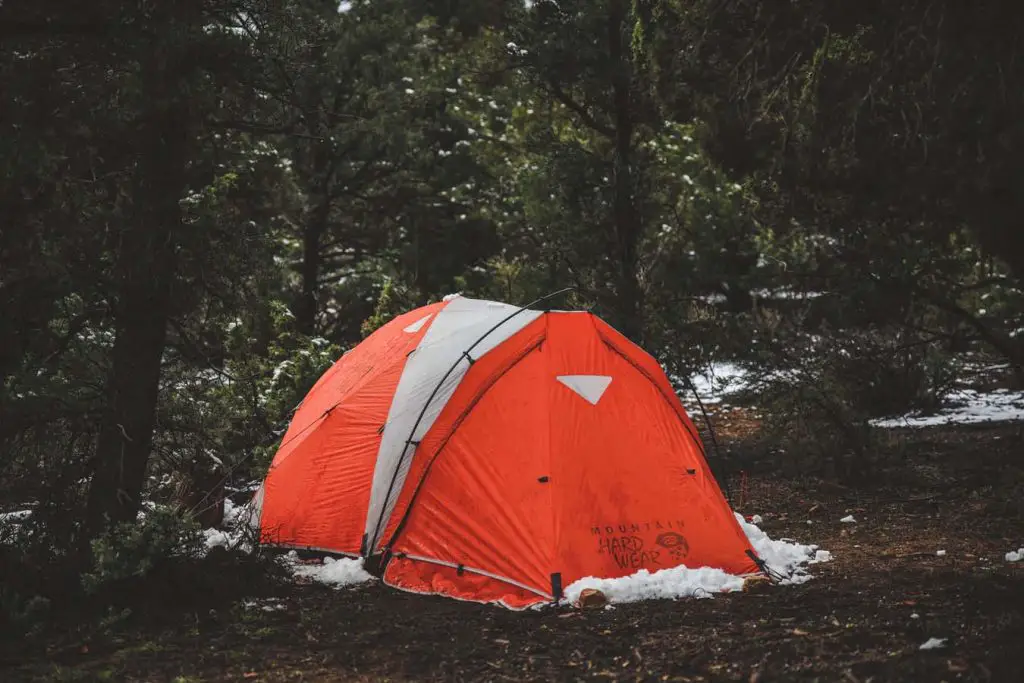
Are catalytic heaters safe in tents?
Catalytic heaters are safe to use in tents. Here is a closer look at what they are and how they work.
A catalytic heater does not produce flames. Instead, it uses chemical reactions to produce heat and keep you warm. They can be really beneficial for when for one reason or another you are unable to light a fire while you are out camping.
The way they work is simple. They rely on chemical reactions to produce heat that easily warms your tent and everyone in it. They need three ingredients including oxygen, fuel and of course a catalyst. The fuel could be natural gas or propane. The catalyst is usually a plate that can be reheated that is often Platinum-coated for better results.
Of course, propane does have the potential for CO emissions. However, this is not too much of a risk with catalytic heaters. Still, be sure to follow all the safety procedures recommended by the manufacturer of your heater.
Before you set up your tent, remember to confirm that the tent is large enough to allow for the flow of air. A larger tent can host many people while at the same time providing enough space to use the catalytic heater.
Some of these heaters are designed in a way they allows them to be hung from the ceiling. If you are using one like that, you should keep checking it to ensure it does not get too hot. The heater needs an airy, well-ventilated space at all times.
Similar to other heaters, the catalytic heater should be shut off overnight. Simply warm the tent before you go to sleep and shut it off.
The following are extra safety tips you can follow while using the catalytic tent heater.
Besides creating room for airy spaces and a well-ventilated tent you should;
- Only use the heater under supervision. If it’s not in use turn it off to avoid fire risks. If you fall asleep while using the catalytic heater you put yourself at danger of fire.
- As stated earlier on, get a carbon monoxide sensor.
- Lastly, you should protect your catalytic heater against getting wet. Keep it in a spot where there are fewer leakages. Also, ensure your tent is dry after maximum perspiration.
Tent heater dangers
In truth, there is no completely safe tent heater. Even with all the right safety precautions put in place, there is still potential for accidents. So, what would make a safe tent heater dangerous?
- Oxygen depletion: Sometimes, technology fails us. For example, when using a propane gas heater, there is a good chance of oxygen depletion. If you have a failed carbon monoxide sensor, it could be fatal. If you use the propane gas heater unattended make sure there is enough ventilation in your tent.
- Carbon monoxide: This can affect both the propane gas heater and the catalytic heaters. When using catalytic heaters, CO is produced if there is the presence of foreign particles, or if the particles inside the heater or dust in the tent gets burnt down to produce it. This is why CO detectors are so important.
- Tipping over: The tip-over feature is a safety requirement in most propane heaters. But it has not to be designed to withstand all variables. Sometimes, it might not automatically shut down when tipped over a particular distance. This means it’s not 100% safe even with the added safety feature.
- Being covered: Imagine that a family member decided to change their clothes and mistakenly covered the heater. The heater will burn the clothes which could lead to a fire break out within the tent. Other things besides clothes could also cover the heater, including backpacks, gear, and blankets or sleeping bags.
- Ambient heat: Heaters are designed to release heat. Sometimes, this heat might leak from all sides, including the bottom, top. This becomes a problem when, say, the heat leak from the bottom, starts melting away the synthetic material used to make most tents. Worst-case scenario, the heater could even start a fire and no one wants that.
Tent heater safety tips
If you are using a propane gas heater ensure it is CSA 4.98 certified. CSA (Canadian Standards Association International) created the 4.98 standards for propane gas standardization.
There should be enough space where you will be using the tent heater. Pick a large tent for more space.
Next, remember to never use the tent heater while you are sleeping. You should also never leave it unattended.
Ventilate your tent. Although this is mostly true for catalytic heaters, it is also important for electric heaters (to avoid moisture buildup). That means you shouldn’t use a heater in a snowstorm, as your ventilation can quickly be affected by snowfall.
Finally, when using a propane tent heater or a catalytic heater, you need a well-ventilated tent. For electric heaters, ventilation is important if you want to avoid too much condensation. All electrical appliances, heaters included, are affected by too much moisture and wetness.
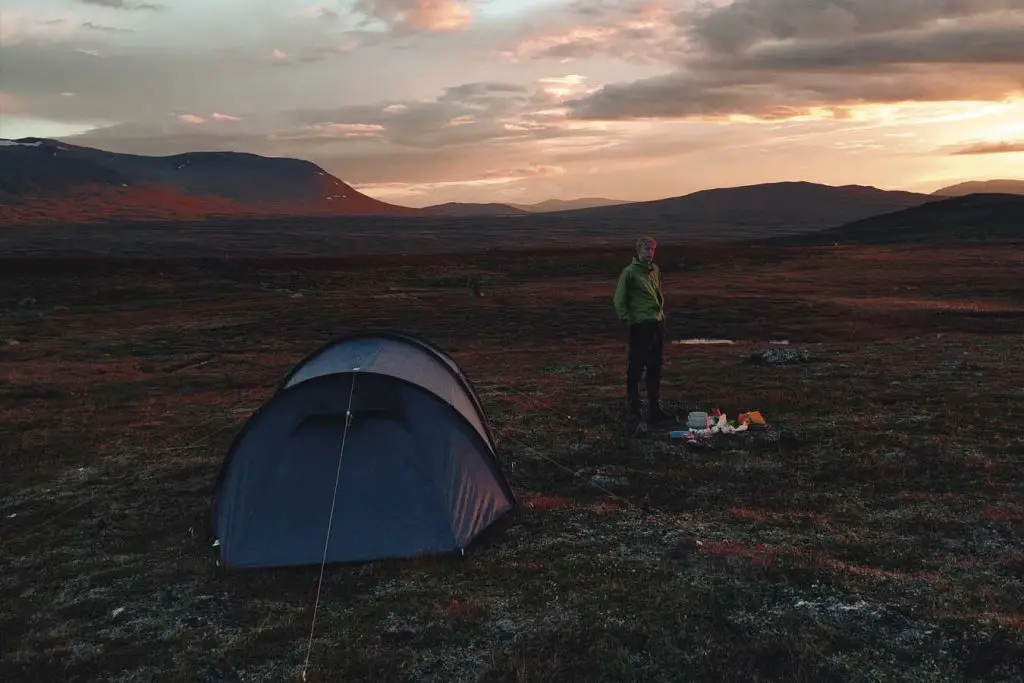
Which heaters should you not use in a tent?
Combustion based heaters
Any heater that burns a combustible substance to produce heat should not be used inside the tent without the appropriate methods of exhausting the fumes/smoke. However, they will only be safe if you have a chimney.
Also, some tents come with a flue to allow for better circulation of air to prevent the smoke formation in the tent.
A regular tent is not designed to handle this type of combustion.
Gas-powered lanterns
Any gas lighting gadget shouldn’t be used for heating purposes within your tent. Indoor heaters are typically made with specific safety features. The best tent heaters should be CSA 4.98 certified.
Summary
Being armed with the right information is the only way to have more fulfilling camping trips.
All types of heaters have their own advantages and disadvantages. There are some that should not be used inside a tent for safety reasons.
However, good tent heaters are often a necessity every time you go out camping, especially in the cold. Therefore, remember to always make sure your tent is well ventilated, always take safety precautions, and go for a larger tent whenever possible.
Never use a tent heater overnight or leave it unattended.
In terms of safety, an electric tent heater is safer than a wood or propane heater. However, the propane heater can be made safer with a few features. Look out for tip-over safety features, and an automatic carbon monoxide detector. If your tent heater does not have this, you can get an external one to help monitor CO levels.
Related guides
Guide To Finding The Best Camping Wood Stove
How To Find The Best Wood Burning Tent Stove

